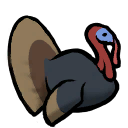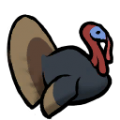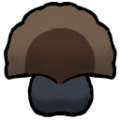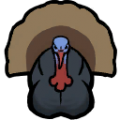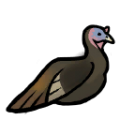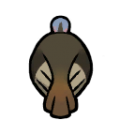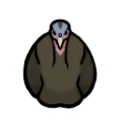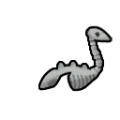Turkey
Turkey
A short, fat, flightless bird known for its hilarious 'gobbling' call. It has been long domesticated, but also lives in the wild.
Base Stats
- Type
- Animal
- Flammability
- 70%
Pawn Stats
- Move Speed
- 3.6 c/s
- Health Scale
- 60% HP
- Body Size
- 0.6
- Mass - Baby
- 3.6 kg
- Mass - Juvenile
- 18 kg
- Mass - Adult
- 36 kg
- Carrying Capacity
- 45
- Filth Rate
- 6
- Hunger Rate
- 0.45 Nutrition/Day
- Diet
- herbivorous
- Life Expectancy
- 9 years
- Manhunter Chance
- 0%
- Manhunter Chance (Taming)
- 0%
- Trainable Intelligence
- None
- Wildness
- 45%
- Minimum Handling Skill
- 3
- Roam Interval
- 7 days
- Mate Interval
- 12 hours
- Maturity Age
- 0.2 years (12 days)
- Juvenile Age
- 0.12 years (7.2 days)
- Comfortable Temp Range
- -8 °C – 40 °C (17.6 °F – 104 °F)
Production
- Meat Yield
 84 turkey meat
84 turkey meat- Leather Yield
 28 birdskin
28 birdskin- Eggs Per Clutch
- 1 to 1
- Egg Laying Interval
- 1.333 days
- Can Lay Unfertilized Eggs
- false
Melee Combat
- Attack 3
- Head
4 dmg (Blunt)
6 % AP
2 second cooldown
0.2 chance factor - Average DPS
- 2.0026
The turkey is a large bird that lays eggs. Male turkeys can be distinguished by a red head and neck, blue body, and a large fanned tail while females are largely brown with a downwards angled tail.
Taming
Turkeys can be tamed wild from temperate forests, temperate swamps, boreal forests, or cold bogs, randomly join your colony in an event, or bought pre-tamed from a trading ship.
Summary
Turkeys are pen animals. Once tamed, pen animals cannot and do not need to be trained any further. But if left outside of a pen or caravan hitching spot, pen animals will eventually roam outside your colony. Making a caravan is not required to tie animals to a caravan hitching spot.
A female turkey produces 1 turkey egg every 1.333 day when fertilized. Contrary to real life, RimWorld turkeys cannot lay unfertilized eggs.
Analysis
Turkeys are one of many egg-laying animals that are inferior to chickens. 2 hens eat less food and lay 233% more eggs than 1 turkey. While chicken eggs are half as large, chickens still lay more food per day. Hens do not need to be fertilized, which adds a further advantage.
Turkeys do have a niche; they are the best egg-laying animal that can be found in the wild.
- Unlike chickens (and ducks), turkeys can be found in the wild. Farm animals must be bought or found via event.
- Many animals, such as horses, are strictly better when slaughtered for meat. But eating turkey eggs won't offend ideoligions
 that forbid meat-eating.
that forbid meat-eating.
Otherwise, you can hunt turkeys for early game meat, and they won't go manhunter on you.
Nutrition
An adult turkey consumes 0.45 nutrition per day, and produces 0.75 turkey eggs.
The optimal ratio of male : female turkeys is 1 male for every 1.78 female turkeys.
- When eaten as eggs, turkeys produce 0.375 nutrition of eggs per day.
- When slaughtered as babies, turkeys produce 0.478 nutrition of meat per day.
Attacks
Turkeys have three attacks: scratch (feet), bite (beak) and less commonly used, blunt (head). In addition to the base damage, the scratch and bite attacks apply a stun for 14 ticks (0.23 secs).
Training
This animal can be trained as follows:
| Guard: | |
|---|---|
| Attack: | |
| Rescue: | |
| Haul: | |
*As of version 1.1.2610, all animals can be tamed. The percentage of likelihood of success depends on factors such as the Animals Wildness Percentage, Pawn Handling Skill, and others. More information can be found on the animals page.
Health
Gallery
Version history
- 1.3.3066 -
